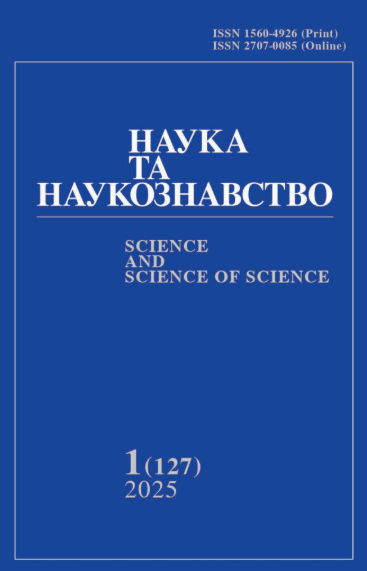Наука у вимірі практичної філософії
DOI:
https://doi.org/10.15407/sofs2025.01.075Анотація
У статті викладено результати аналізу науки з точки зору концепту практичної філософії науки та комунікативної філософії. Новизна статті полягає у поширенні на сучасну науку підходів практичної філософії, що дає можливість розглянути вплив науки на суспільство та імплементацію наукового знання з точки зору комунікативної філософії. Аналіз виконано з використанням онтологічного, гносеологічного і синергетичного підходів практичної філософії науки. Введення сучасної науки в комунікативний, аксіологічний і трансцендентальний виміри практичної філософії передбачає застосування до неї методів комунікативної філософії, трансцендентального та аксіологічного підходів. Джерелами аналізу сучасної науки у вимірі практичної філософії є дослідження трансцендентальної прагматики, аксіологічного та комунікативного вимірів сучасної практичної філософії. Розглянуто практичну філософію науки, зокрема синергетичні концептуальні основи сучасної онтології науки. Визначено особливості впровадження наукових знань у соціальні практики. Встановлено, що концепт практичної філософії науки пов’язаний із реалізацією синергетичних моделей. Показано технологічний вимір впровадження наукових знань у соціальні практики, який розкриває образ науки як науки відкриттів і технологій. Проаналізовано різні способи реалізації результатів наукових досліджень. Доведено, що практичний вимір науки пов’язаний із впровадженням знань та економікою знань. Розкрито значення когнітивних продуктів для трансформації онтології інформаційного суспільства. Зроблено висновок, що наукові дослідження з точки зору сучасної практичної філософії дозволяють запровадити комунікативні, онтологічні та аксіологічні підходи до аналізу впровадження наукових знань у соціальні практики. Обґрунтовано необхідність поглиблення розгляду онтологічного виміру комунікацій і дискурсів шляхом впровадження знань і когнітивних цінностей у комунікативну практику.Посилання
Rubanets, O.M. (2006). Information Society: Cognitive Creativity of Post-NonClassical Research. Kyiv: PARAPAN Publishing House [in Ukrainian].
Rubanets, O. (2019). Transformation concept “Information technologies” in modern scientific discourse. Transfer of Innovative Technologies, 2, 60—67. https://doi.org/10.31493/tit1921.0301
Dobronravova, I.S. (2017). Theoretical reconstruction of nonlinear phenomena: epistemological
foundations and scientific discourse. Philosophy of Education, 1 (20), 30—42 [in Ukrainian].
https://doi.org/10.31874/2309-1606-2017-20-1-30-42
Dobronravova, I. (2017). Practical philosophy of science: collection of scientific works. Sumy: University book [in Ukrainian].
Kochubey N.V., Nesterova M.O. (Eds.) (2023). Man in a complex world. Sumy: University Book [in Ukrainian].
UNESCO (2005). Report by the director-general on an intersectoral strategy on philosophy. URL:
https://unesdoc.unesco.org/ark:/48223/pf0000138673 (last accessed: 10.01.2025).
UNESCO (2006). Intersectoral strategy on philosophy. URL:
https://unesdoc.unesco.org/ark:/48223/pf0000145270 (last accessed: 10.01.2025).
Hübner, K. (2002). Kritik der wissenschaftlichen Vernunft. Karl-Alber-Verlag. https://doi.org/10.5771/9783495993699
Malakhov, V. (2009). The сode of ethics of a scientist: axiology and pragmatics. Visn. Nac. Akad. Nauk Ukr., 5, 12—19 [in Ukrainian].
Melnychenko, A. (2016). The code of honor as a tool for maintaining academic honesty of a
scientist and educator. Academic honesty as the basis of sustainable university development. Kyiv: Takson,
—182 [in Ukrainian].
Gosle, V. (1999). Transcendental pragmatics as the Fichteanism of intersubjectivity. Yermolenko, A.M. Communicative practical philosophy. Part II. Selected texts. Kyiv: Libra, 456–478 [in Ukrainian].
Apel, K.-O. (1999). Ecological crisis as a challenge to discursive ethics. Yermolenko, A.M Communicative practical philosophy. Part II. Selected texts. Kyiv: Libra, 413— 454 [in Ukrainian].
Yermolenko, A.M. (1999). Communicative practical philosophy. Selected texts. Kyiv: Libra [in Ukrainian].
Husserl, E. (2002). The crisis of European sciences and transcendental phenomenology.
Philosophical Thought, 3, 134—149 [in Ukrainian].
Husserl, E. (2021). Cartesian meditations. Introduction to phenomenology. Kyiv: Tempora [in Ukrainian].
Rubanets, O.M. (2022). The cognitive sphere of a society and a human: information, mentality, identity. Sumy: University book [in Ukrainian].
Muratova, I.A. (2019). Technology: universalizing and unifying the social being. Kyiv: Millennium [in Ukrainian].
Kochubey, N., & Nesterova, M. (Eds.) (2019). Cognitive technologies in education and social
practice: possibilities of application. Lambert Academic Publishing [in Ukrainian].
Habermas, J. (1996). Communicative action and discourse. Sources of communicative philosophy. Kyiv: Lybid, 84—91 [in Ukrainian].
Baudrillard, J. (2004). Simulacra and simulation. Trans. from French. Kyiv: Solomiya Pavlychko’s Publishing House “Osnovy” [in Ukrainian].
Debord, G. (2021). The Society of the Spectacle. Cambridge: Unredacted Word. https://doi.org/10.2307/j.ctv1453m69
Kittler, F. (2009). Towards an Ontology of Media. Theory, Culture and Society, 26, 23—31.https://doi.org/10.1177/0263276409103106
Apel, K.-O. (1999). Die Situation des Menschen als ethicals Problem. Zeitschrift für Pädagogik, 28 (5), 677—693. https://doi.org/10.25656/01:14223
Jonas, G. (2001). The Principle of Responsibility. In Search of an Ethics for the Technological Age. Kyiv: Libra [in Ukrainian].
Boychenko, N.M. (2016). Ethical values of the modern university education: Philosophical reflection. Dissertation for Doctor of Philosophy. Kyiv [in Ukrainian].
##submission.downloads##
Опубліковано
Як цитувати
Номер
Розділ
Ліцензія
Авторське право (c) 2025 Наука та наукознавство

Ця робота ліцензується відповідно до Creative Commons Attribution-NonCommercial-NoDerivatives 4.0 International License.






